Hussam al-Mahmoud | Jana al-Issa | Yamen Moghrabi
The Syrian file seemed to preoccupy Saudi Arabia in terms of the intensity of the moves undertaken by Riyadh in April and the steps it took to rehabilitate regime’s head Bashar al-Assad within the Arab world since Syria’s suspension from the 22-state League in 2011 over his brutal crackdown on peaceful protests that demanded his overthrow.
Meetings, statements, a Syrian-Saudi ministerial conference, and final statements formed the engine of intense events that crowded in a week to discuss the Syrian file, which has been stagnating for 12 years, and despite repeated attempts to revitalize, the same political stagnation follows, and the bill is always paid for by the blood of Syrians.
And if the stagnant political tracks and UN resolutions, which did not go beyond voting, were considered a dictionary for the intractable political solution in Syria for years, then Riyadh is today undertaking an Arab push to rehabilitate al-Assad.
A push accompanied by a lack of European and American blessings and other Arab countries’ calling on the regime to adhere to the Security Council resolution 2254, which set a roadmap for a political transition.
In this weekly file, Enab Baladi discusses with a group of researchers and experts the Saudi rapprochement with the Syrian regime, Riyadh’s efforts to restore the regime to the Arab fold, in addition to the position of the Syrian opposition, and the US and European positions, regarding these steps, while reading the political and economic effects outcomes.
Saudi Arabia greets al-Assad
Riyadh clearly changed its tone towards the regime after the devastating Feb.6 earthquake, leading to high-level meetings and talking about meetings at a larger level in the foreseeable future.
An almost radical change after nearly a decade of estrangement and after many statements in which Riyadh attacked the Syrian regime, including al-Assad and his politicians, and in turn, the regime media attacked the Kingdom and its rulers.
A change came despite the Saudi assertion at the end of 2021 that the war in Syria had not ended and that al-Assad was standing on a “pyramid of corpses.”
On April 18, al-Assad received the Saudi Foreign Minister, Faisal bin Farhan, on a Saudi visit, the first of its kind to Damascus, since the outbreak of the Syrian revolution in 2011.
The visit, which lasted only hours, was followed by a statement from the Saudi Foreign Ministry, stating that the minister conveyed the greetings of King Salman bin Abdulaziz and Crown Prince Mohammed bin Salman to al-Assad.
During the meeting, they discussed the efforts exerted to reach a political solution to the “Syrian crisis,” and the necessary steps to achieve a comprehensive political settlement that would end all repercussions of the “crisis” and achieve national reconciliation, and contribute to the return of Syria to its Arab surroundings, and the resumption of its natural role in the Arab world, according to the statement.
Less than a week before, this visit was preceded by a similar visit by the Syrian Foreign Minister, Faisal Mekdad, to the coastal city of Jeddah, at the invitation of his Saudi counterpart on April 12.
In a joint press statement at the end of the visit, the two sides agreed on the importance of resolving humanitarian difficulties, providing the appropriate environment for aid to reach all regions of Syria, and creating appropriate conditions for the return of Syrian refugees and displaced persons to their areas, and enabling them to return safely to their homeland.
The two sides also stressed the importance of strengthening security and combating terrorism in all its forms and organizations, enhancing cooperation in combating drugs smuggling, and the need to support state institutions to extend their control over their lands to end the presence of “armed militias” in them, and external interference in Syrian affairs.
The statement touched on the necessary steps for a comprehensive political settlement to end the repercussions of the “crisis,” achieve national reconciliation and contribute to the return of Syria to its Arab surroundings, which are issues that Ibn Farhan also discussed in his meeting with al-Assad.
On February 18, on the sidelines of the Munich Security Conference 2023, the Saudi foreign minister said that there is “an Arab consensus that the situation in Syria should not continue as it is.”
During the same conference, the Kuwaiti Foreign Minister, Salem Abdullah al-Jaber al-Sabah, affirmed that Kuwait’s position on the regime is firm and that there are no plans for normalization after the earthquake, which was an indication of the absence of a common formula on future Arab engagement with the regime.
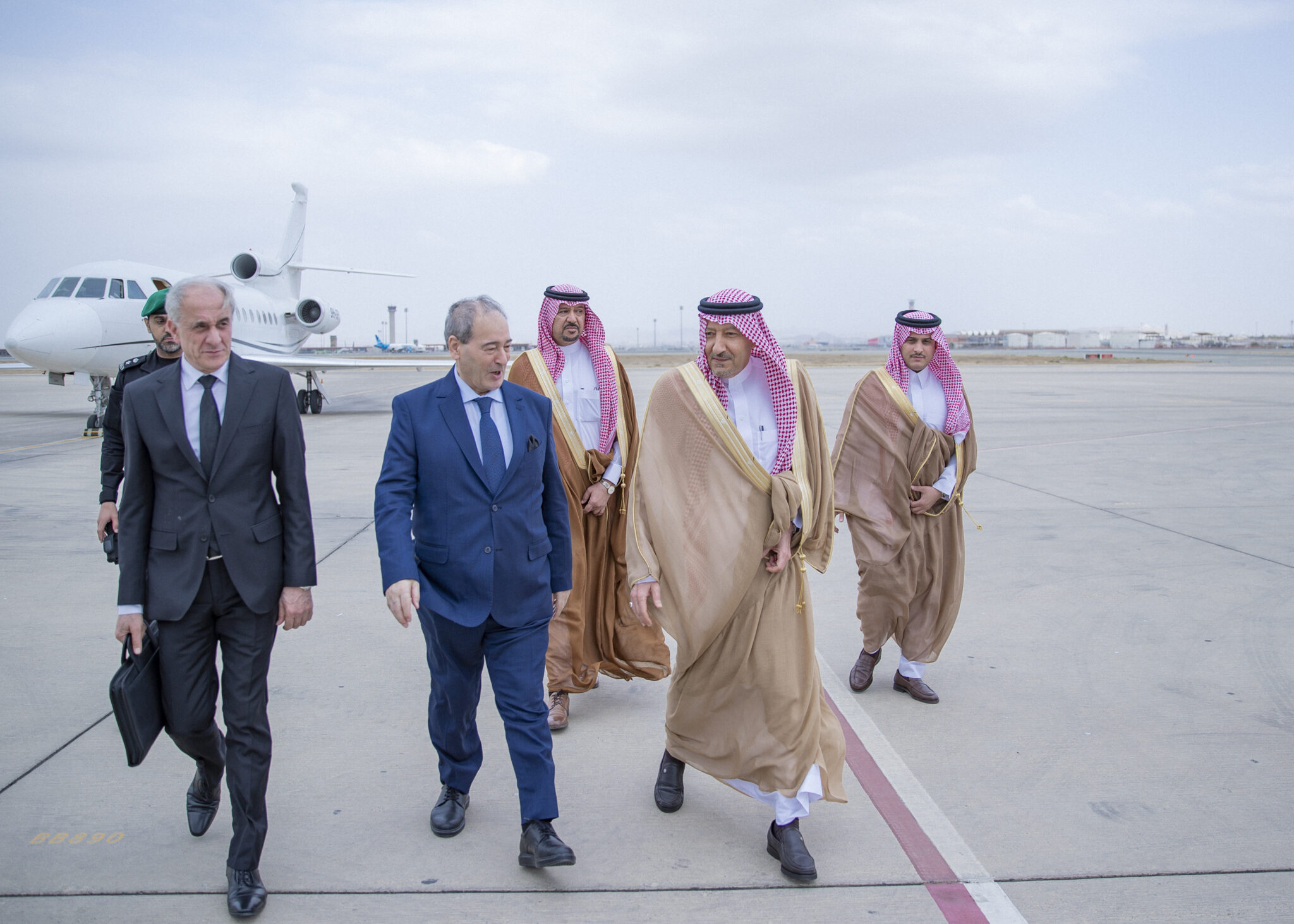
The Saudi Deputy Foreign Minister receives the Syrian Foreign Minister on his first visit to Saudi Arabia since 2011 – April 12, 2023 (SPA)
“True intent is a must”
The relatively quick steps towards Damascus divided the opinions of researchers, as the retired Saudi major general and researcher in strategic and security studies, Abdullah bin Ghanem al-Qahtani, questioned the possibility of applying what was stated in the joint statement of the two foreign ministers, explaining that the fight against terrorism cannot be achieved unilaterally.
Al-Qahtani ruled out the ability of the Syrian regime to get rid of the militias that support it, including Hezbollah, which the US, Britain, and Arab and foreign countries classify as a “terrorist” group.
The Saudi researcher said in an interview with Enab Baladi that the regime’s distance from these organizations would not happen soon, as is hoped, but it will find itself forced, with time, to distance itself from them.
In addition, Iran is standing in a “gray area,” and it is not clear whether it will reduce its presence in the Syrian file or not, according to recent political understandings, says al-Qahtani.
On the issue of the regime extending its influence over the entire Syrian territory, al-Qahtani explained that a step of this kind requires ending the role of foreign militias and expelling them, establishing good relations with neighboring countries, a solution to the internal crisis, and the conviction and reassurance of the Syrian people regarding a government, whether it is in Damascus or another one that follows.
This requires a different political approach at the level of the government of the regime, the people, and the opposition, according to the Saudi military expert.
Al-Qahtani added that the items of the ministerial statement can be verified if the intentions are true, but some of them require a long time, such as reconciliation, the return of refugees and displaced persons, and the expulsion of foreign militias.
There may be something that is already excluded, especially when it comes to totalitarian regimes that have a long history of non-reconciliation with their people and their neighbors, according to his description.
Regarding the position of Western sanctions on this rapprochement, the researcher believes that it is possible to reach what prevents them, such as the Syrian regime’s reconciliation with the people, good relations with its neighbors, real goodwill, and a solution to other outstanding political and security issues.
All of this will pave the way for the lifting of sanctions, with the need to question the extent of the regime’s ability to reconcile with itself and its people, given that the international strategic environment is complex and is not in the interest of the regime or the region as a whole, and Riyadh does not want the region to remain managed by interventions and opportunists that have not achieved progress or benefit.
At the same time, al-Qahtani referred to changes in the Iranian position with Saudi Arabia without the possibility of determining whether they were tactical steps or convictions and whether there were international guarantees for this change of positions.
|
Everyone who revolves in the orbit of Iran, whether politically, security, military, economically, stately, or sectarian, is forced to follow its steps in peace and war, peace and change in approach. Abdullah bin Ghanem al-Qahtani, a retired Saudi Maj. Gen and researcher in strategic and security studies |
While the Saudi journalist Nawaf al-Qudaimi, director of the Arab Network for Research and Publishing, expressed his surprise at the Saudi decision on Twitter, saying: “Saudi Arabia, which forced the US President, Joe Biden, to back down from his refusal to visit it, is responding to restoring relations with “a low regime that does not control a quarter of Syria, killed half a million, displaced half of the people, inflicted dozens of insults on Saudi Arabia, and exports drugs to it.”
On April 13, more than 3.6 million amphetamine tablets concealed in a potato shipment were confiscated by Saudi authorities in the Riyadh region, Maj. Mohammed al-Nujaibi, spokesman for the General Directorate for Narcotics Control, said, the Saudi news agency (SPA) reported.
The drug haul had an estimated street value of approximately $36m to $90m, according to research published in the International Addiction Review Journal, which said users paid in the range of $10-$25 a pill, according to the Saudi Arab News daily.
The statement of al-Nujaibi did not address the nationalities of those involved in the operation, but another operation preceded it on March 2, during which the Saudi authorities seized 4.9 million amphetamine pills hidden in an electric cable shipment that was planned to be received by a Syrian resident, according to SPA.
“The Saudi authorities continue in their crackdown on the supply and use of illegal narcotics with millions of amphetamine tablets seized almost every week,” the Arab News said.
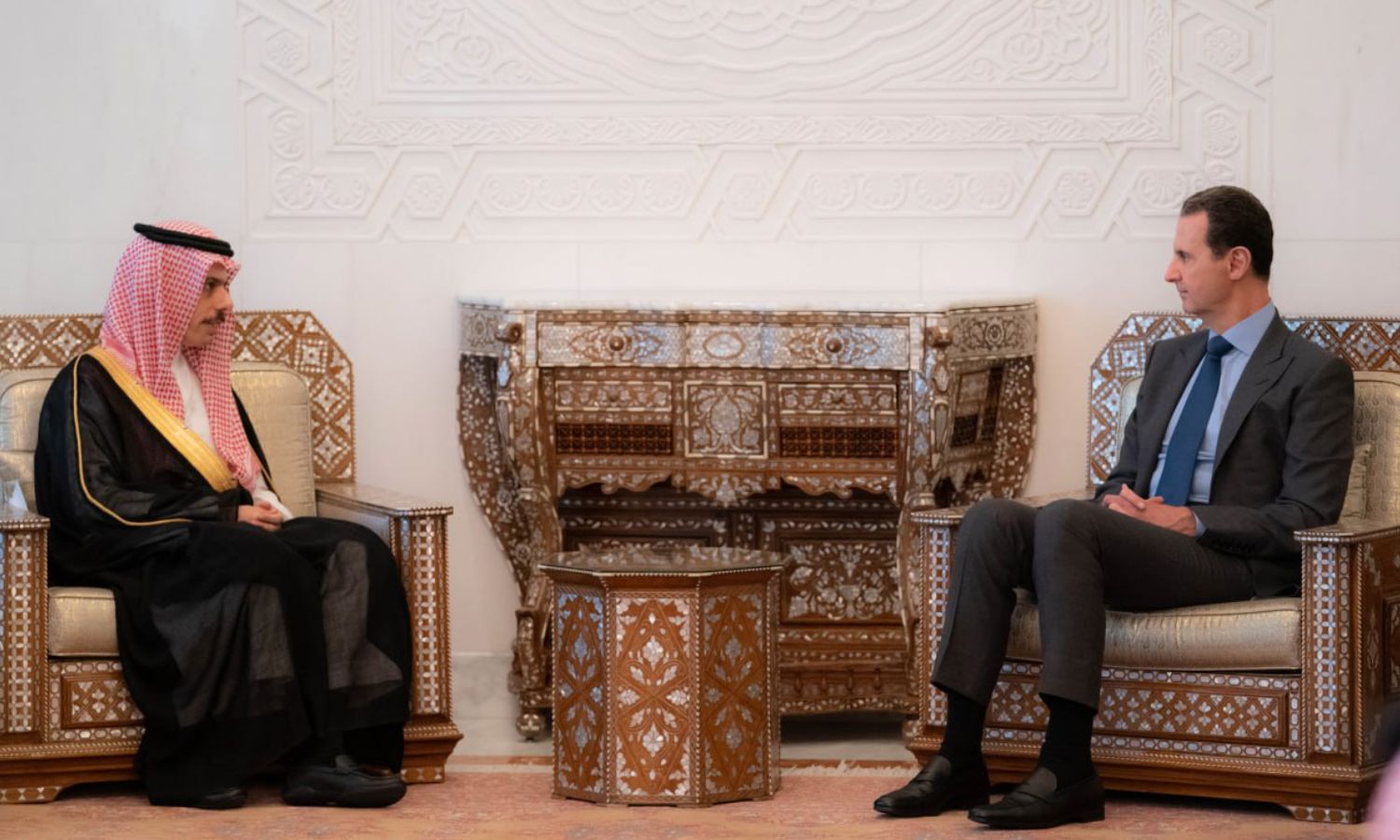
The head of the Syrian regime, Bashar al-Assad, receives the Saudi foreign minister in Damascus – April 18, 2023 (Telegram/Syrian Presidency)
West criticizes, no act
Luis Miguel Bueno, EU Arabic spokesperson for the Middle East and North Africa, confirmed that the European position on normalization with the Syrian regime will not change before it actually engages in a political solution in accordance with UN Resolution 2254, which was reaffirmed at the 16-18 April meeting of the G7 foreign ministers in Japan.
The spokesman pointed out to Enab Baladi via email that the international community cannot consider the issue of reconstruction unless progress is made towards a political solution.
He added, “However, the European sanctions against individuals and entities of the regime do not have an external effect, and they are binding on the institutions and citizens of the EU, and do not affect countries that take their sovereign decisions based on their national interests and legislation.”
|
The Syrian regime must effectively reach a comprehensive and sustainable political solution to the crisis; unfortunately, that did not happen. In the event that an Arab country or the Arab League states put forward certain conditions in order to restore diplomatic relations with the Syrian regime, then the decision is entirely up to these countries or that organization (Arab League). Luis Miguel Bueno, EU Arabic spokesperson for the Middle East and North Africa |
The spokesperson stressed that the Union does not see an alternative to Resolution 2254 to reach a solution in Syria, stressing the European commitment to continue standing by the Syrian people on the political and humanitarian fronts, adding, “We would be pleased to see a similar level of commitment from other international partners as well.”
Indecisive US position
The US position faltered between shock and expectation of the Saudi move, despite hinting in advance of punishing those who normalize relations with al-Assad.
On February 28, the US House of Representatives pledged to hold accountable those who normalize relations with the Syrian regime in its vote on a resolution that must be passed by the Senate before it is approved by US President Joe Biden.
This open American warning did not hinder the next step for Riyadh, which proceeded from statements to meetings, to which Washington’s reaction came sequentially and as expected.
On April 6, The Wall Street Journal reported that CIA Director William Burns, during an unannounced visit to Riyadh, told the Saudi crown prince that Washington was shocked by Riyadh’s rapprochement with Tehran and Damascus.
On April 11, Ambassador William Roebuck, the executive vice president of the Arab Gulf States Institute in Washington and former advisor to the Special Representative for Syria, considered in a long analysis that reports about a Saudi decision to establish relations with the regime as unsurprising, especially with the recent Saudi moves. Rather, it is moving in the same direction as the consolidation of Arab and regional consensus.
On April 15, after meeting in Saudi Arabia to discuss Syria’s political fate, a group of regional leaders promised to continue talks to reach a political solution to the Syrian conflict but stopped short of endorsing its return to the Arab League, the Associated Press reported.
The meeting included top diplomats from the Arab Gulf countries as well as Egypt, Jordan, and Iraq.
The Financial Times revealed that Qatar, Kuwait, Morocco, and Yemen had opposed the regime’s return to the Arab League, with Egypt abandoning its opposition to the regime on condition that Damascus show progress in the political track.
On the same day, Bob Menendez, Chairman of the Foreign Relations Committee in the US Senate, criticized the Arab normalization efforts with the Syrian regime, pointing out that it goes beyond its violations since the continuation of drug trafficking threatens the societies of the region.
The American statement was preceded by another, on April 13, by the Chairman of the Foreign Affairs Committee in the US House of Representatives, Michael McCaul, who considered normalization with al-Assad to give him legitimacy as the head of a terrorist drug state and to consolidate Iran’s influence.
McCaul said on Twitter at the time, “Assad is bombing Syrians and undermining regional stability. Normalizing now legitimizes him as head of a terrorist narco-state and entrenches Iran. Returning him to the Arab League is a strategic error– countries should pull this back now.”
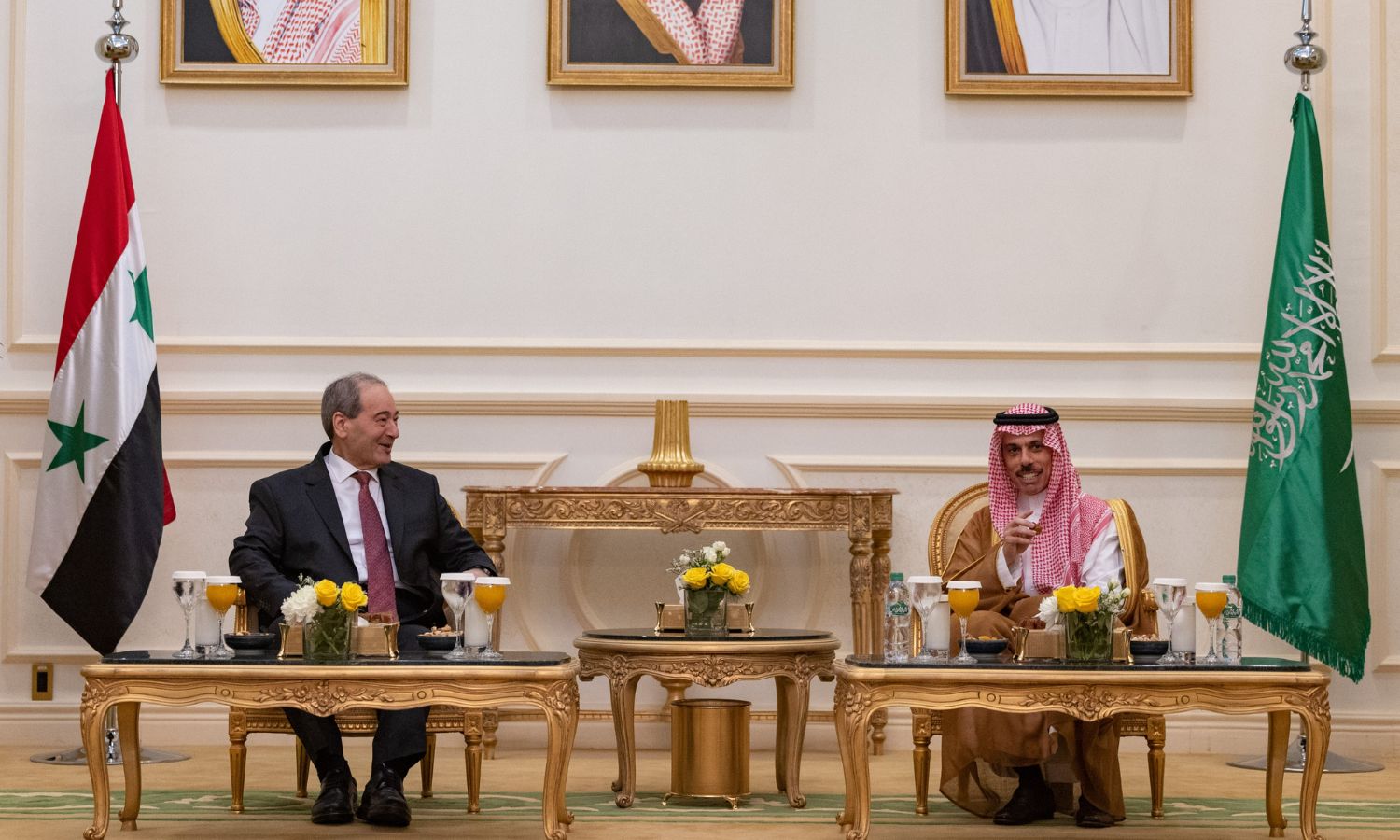
Syrian Foreign Minister Faisal Mekdad, on his first visit to Saudi Arabia since 2011- April 12, 2023 (SPA)
Doesn’t meet aspirations
Saudi-Syrian ministerial statement
The Saudi-Syrian ministerial statement focused on issues that did not cover aspects of the Syrian file as a whole (including the detainees and the missing), but what was raised was sensitive at the same time, especially the call to regain control of the land and stop drug smuggling, the lifeblood of the Syrian regime to earn billions of dollars, which was revealed by Western press reports and was covered by statements by Western officials.
Abdulwahhab Assi, senior research fellow at Jusoor Center for Studies, considers that Western sanctions constitute an obstacle to any support that Arab countries think of for the Syrian regime outside of exceptions for humanitarian aid.
Assi considered the focus of the Syrian-Saudi statement on the “national reconciliation,” without addressing UN resolution 2254, as an indication of the Kingdom’s readiness to accept settlement processes as an alternative to the political process under UN patronage.
This collides with the absence of an Arab consensus, as some Arab countries insist on implementing the solution in accordance with United Nations resolutions, according to the researcher.
Assi added that the regime’s control over the Syrian territories and the expulsion of foreign forces is nothing more than a protocol evocation, given the large military coverage it requires in light of the Russians’ preoccupation in Ukraine, the Iranian unwillingness to slip into a military confrontation, and the Arab unwillingness to create security and military tension on the ground.
On the issue of combating drugs, which is considered the most important issue for Riyadh, Saudi Arabia may move to provide greater support to Jordan (the border country with Syria) to strengthen its war on Captagon since the regime is unable or unwilling to stop a huge source of funding for it.
In the face of its inapplicability to a large extent, the senior research fellow at Jusoor considered that the statement suggests Saudi Arabia’s intention to restore Arab influence in the Syrian file, perhaps in response to a bargaining policy with Iran, which means that any Iranian efforts or steps in Yemen will be met by Riyadh with steps in Syria.
For his part, Faysal Abbas Mohamad, a retired Syrian-Canadian professor of international relations and Middle Eastern politics, referred to the “generality and lack of seriousness” in the statement.
Some of the files dealt with in the statement are subject to the approval of other countries that will not make a free concession of this size to the Syrian regime, nor did it address the issue of detainees and the forcibly disappeared in the regime’s prisons, Mohamad asserts.
He adds that there does not seem to be a real solution on the Saudi agenda that comes close to the legitimate aspirations of the Syrian people.
With regard to combating drug trafficking, Mohamad ruled out the regime’s ability to influence the file associated with Maher al-Assad, Bashar al-Assad’s brother, and the Iranians behind him.
Giving up this “weapon” is not easy, but nothing prevents al-Assad from making promises or displaying “good intentions” through “theatrical” changes in the customs leadership, which will not change the essence of the issue, says the International Relations professor.
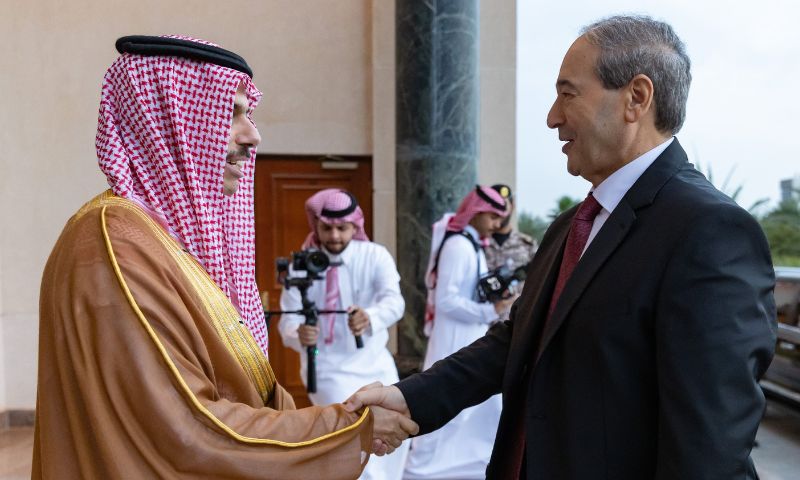
Syrian Foreign Minister Faisal Mekdad in Jeddah for the first time since 2011 with Saudi Foreign Minister Faisal bin Farhan – April 12, 2023 (Twitter/Saudi Foreign Ministry)
|
The (Saudi-Syrian) statement seems as an attempt to save Saudi face from critics of the hasty and lenient normalization with the al-Assad regime, including some Arab governments. Faysal Abbas Mohamad, Syrian-Canadian professor of Middle Eastern politics |
Syrian opposition, the lost role
The Saudi and Arab rapprochement with the Assad regime opens the door to questions about the ability of the Syrian opposition institutions to deal with the current developments and the extent to which they are able to maintain a state of balance, at least at the current stage.
On April 13, the Syrian opposition coalition issued a statement considering Riyadh’s reception of Mekdad as an additional complication for the political process, stressing that rapprochement with the regime is not an option for a solution in Syria, calling on the Saudi Kingdom to review its position, as it demanded, on April 3, not to allow the Syrian regime to return to the Arab League.
With the exception of the two statements and the visit of Salem al-Meslet, head of the Syrian Opposition Coalition (SOC), to Doha to meet the Turkish ambassador to Qatar on April 14, no statements were issued regarding the developments of the file, except a tweet by SOC head praising Qatar’s position of the Syrian regime.
Hussam al-Hafez, head of the Syrian Council for International Relations, told Enab Baladi that the opposition institutions are “absent and missing.”
Meanwhile, Bassam al-Quwatli, head of the Syrian Liberal Party (Ahrar), believes that “the official opposition has ended, and all that remains is for the countries that support it to stop financial funding so that its death becomes official,” according to his opinion.
Al-Hafez indicated that “the opposition, which is absent at the level of institutions, is present as a popular basis that rejects the process of normalization with the regime and continues to desire to bring about a fundamental change in the structure of the regime and the state in preparation for a new phase.”
Over the past years, the Syrian opposition has established political relations with several countries (Turkey, Saudi Arabia, Qatar, and Egypt), which have hosted meetings and political meetings, and supported the opposition logistically.
However, many variables have reduced the opposition’s ability to influence and make a difference in the Syrian file, as al-Quwatli indicated the absence of the opposition from the meetings that brought Turkey together with the Syrian regime under Russian sponsorship and Iranian presence as well.
In turn, Hussam al-Hafez attributed the reasons for this decline to the fact that opposition institutions affiliated with certain countries do not have a margin for dialogue about decisions taken by those countries regarding the Syrian file, which makes them lose their influence.
Also, some opposition institutions are consistent with the decisions of their supporters without trying to pressure them to modify or change the position of the supporter or dissuade him from a step that may not be appropriate for the opposition, for example, al-Hafez added.
The head of the Syrian Council for International Relations believes that the Syrian opposition, during the past years, gave all its keys to the allied countries, and it did not produce a strong government capable of managing and controlling areas outside regime-held areas.
This also contributed to the further weakening of its position, while Bassam al-Quwatli, head of the Syrian Liberal Party, focused on the failure of the opposition’s approach to the Syrian people and the lack of a convincing model as an alternative to al-Assad.
In order to break the political stagnation of the Syrian opposition, al-Hafez suggested dissolving the Syrian Opposition Coalition (SOC) and establishing an alternative political body with different members and new faces, far from the internal problems that the Coalition experienced.
“The Coalition has become a crippling force that does not have its own control over itself and obstructs political action, especially after it previously gained international weight by preventing the existence of other Syrian opposition political bodies,” al-Hafez said.
Al-Hafez also indicated that opposition figures are calling for work on a new body that has the elements of survival and steadfastness for a long time, or transferring the “Coalition” to a European country and re-institutionalizing and restructuring it, which opposition politician Bassam al-Quwatli, head of the Syrian Liberal Party also considers “the only remaining option.”
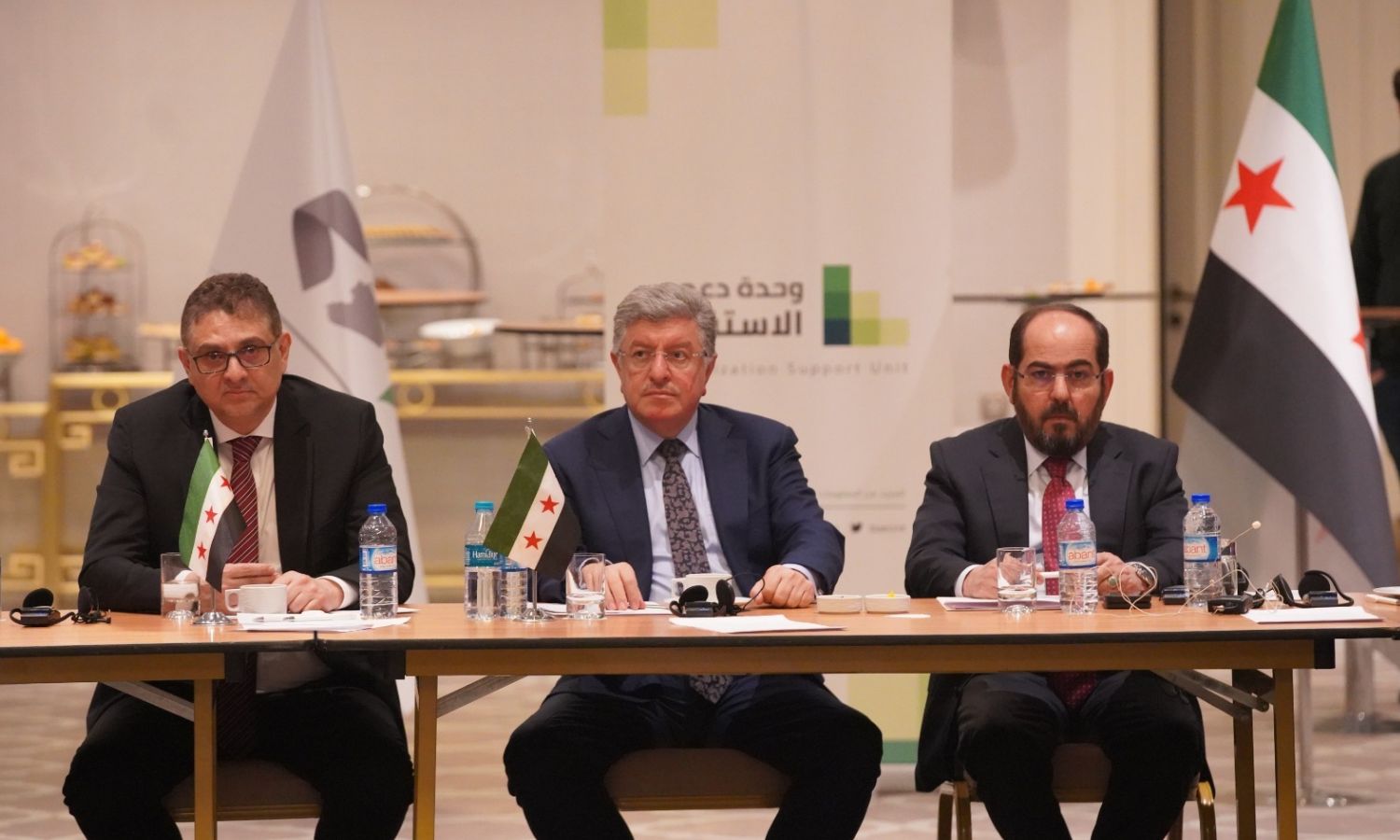
Abdulrahman al-Mustafa, head of the Interim Government (R), Salem al-Meslet, head of the Syrian Opposition Coalition (C), and Badr Jamous, head of the Syrian Negotiations Commission (L), February 24, 2023 (Facebook/Negotiations Commission)
|
The opposition cannot deny that there is a new phase, and we, as the forces of the revolution and the opposition, must deal with this phase in a new way that is far from unwise. We must also take into account the interests of countries that follow the path of normalization with the regime or others, as well as dealing with all segments of the Syrian people and their components in a more democratic manner. Hussam al-Hafez – President of the Syrian Council for International Relations |
Common interests
The timing of the “reconciliation” between Saudi Arabia and the regime raised many questions about the reasons for that, especially since the visit of the regime’s foreign minister took place a few weeks before the Arab summit to be held in Riyadh on May 19.
In addition, the radical change in the Saudi position highlighted the existence of undeclared goals on both sides, which prompted the acceleration of the rapprochement.
Ayman al-Dassouky, a political economy researcher at the Omran Center for Strategic Studies, believes that the two parties have their own calculations regarding the return of relations.
The regime is looking for political cover and economic support to help it break its political isolation and face the economic and service benefits of the post-war period, and Saudi Arabia is capable of that if it wishes, according to the researcher.
In addition, improving the relationship with Riyadh will give the regime a margin of political maneuver to balance its relations with its allies, Russia and Iran, and improve its negotiating position with Turkey, al-Dassouky added.
The researcher believes that the Saudi endeavors fall within a broader policy related to the Kingdom’s view of the region and its role in it, its response to existing international developments, and the fulfillment of the requirements of its internal stability, as it adopts a policy of calm to cool regional crises for fear of their development in light of the existing international polarization, and its possible repercussions on its security.
|
Saudi Arabia’s openness to the regime is part of the Kingdom’s efforts to calm the region’s crises and address their security and humanitarian repercussions. This requires communication with the actors in these crises, including the Syrian regime. There is also an attempt by Saudi Arabia to enhance its role as a regional power that has relatively margins of movement away from its American ally. This is what makes Saudi Arabia keen to propel the Syrian file and show it at the next Arab summit. Ayman al-Dassouky, political economy researcher |
Faysal Abbas Mohamad, the Middle Eastern politics professor, pointed to the weakness of the economic and financial structure of the regime, which makes it in need of Saudi and Gulf money.
Also, normalization with Arab countries means the regime will restore Arab “legitimacy” that was withdrawn from it in 2011, and it wants to use it to support its claims of victory over the “global conspiracy,” the professor added.
On the other hand, relations with the regime for Saudi Arabia constitute an important axis within a larger and more important file, which is the relationship with Iran, and the new direction of the Saudi Crown Prince, represented in reducing tension with Iran, according to Mohamad.
The academic researcher considers that Riyadh is fully aware of the weakness of the Iranian regime’s position in light of the stifling economic sanctions it suffers from, and a state of internal instability due to the continuation of popular protests, which pushes Riyadh to exploit the situation, in order to extract Iranian concessions in hot files, including Yemen and Syria.
According to an analysis by the Arab Center in Washington on March 28, the Arab countries that have recently been involved in negotiations with the Syrian regime do not want to see Syria as a failed state, as these countries fear the outbreak of new opposition to al-Assad inside Syria, which may have a contagious effect on those countries.
Effect may be lost in reality
The Saudi-Syrian rapprochement raises questions about its effects on the near future of Syria and the countries of the region.
According to the Strategic Fiker Center for Studies, the regional changes and the continuation of the state of chaos in many Arab countries make it necessary to try to bridge points of view and mitigate intra-differences to avoid more conflicts that may lead to more external interference.
Accordingly, Saudi Arabia’s rapprochement with the Syrian regime has become more urgent than ever, especially since countries such as the Emirates, the Sultanate of Oman, Jordan, and Egypt have taken this step, the center said in a research paper published on March 9.
Professor Mohamad believes that this deepening of the Syrian-Saudi rapprochement will achieve, at least in part, what the regime hopes for in terms of Saudi financial and political support, and thus gain more Arab float for it and greater “credibility” that falls within the familiar propaganda about the victory of the so-called “axis of struggle, steadfastness and resistance.”
With regard to Saudi Arabia, the development of relations with al-Assad will be considered an important addition to its efforts aimed at rearranging the Arab House under its mantle, he added.
According to the restoration of relations between Saudi Arabia and the regime, the latter may mainly obtain economic support directed to support economic recovery activities and the return of refugees, in addition to political cover that helps it to continue its integration into the regional and international system, according to al-Dassouky.
The researcher believes that the nature of this path, which falls within the “step-by-step” policy, the regime’s mentality and method of procrastination by delving into details and evading the implementation of its obligations and making substantial concessions will ultimately lead to a brake on normalization efforts with the regime and not to bring about qualitative changes that contribute to a political settlement, and to be content with marginal concessions and a political movement without an actual impact on the path of the settlement, but only containing its negative repercussions, al-Dassouky concluded.
if you think the article contain wrong information or you have additional details Send Correction
النسخة العربية من المقال
-
Follow us :
Most viewed
- Al-Sharaa and Abdi reach agreement on merger of SDF into Syrian state
- Turkey confirms continuation of its operations in northeastern Syria
- Syrian Defense Ministry appoints "Abu Amsha" as Hama Brigade commander
- Governor of As-Suwayda signs understanding agreement with al-Hijri: Key details unveiled
- No financial flows to Syria despite partial lifting of sanctions












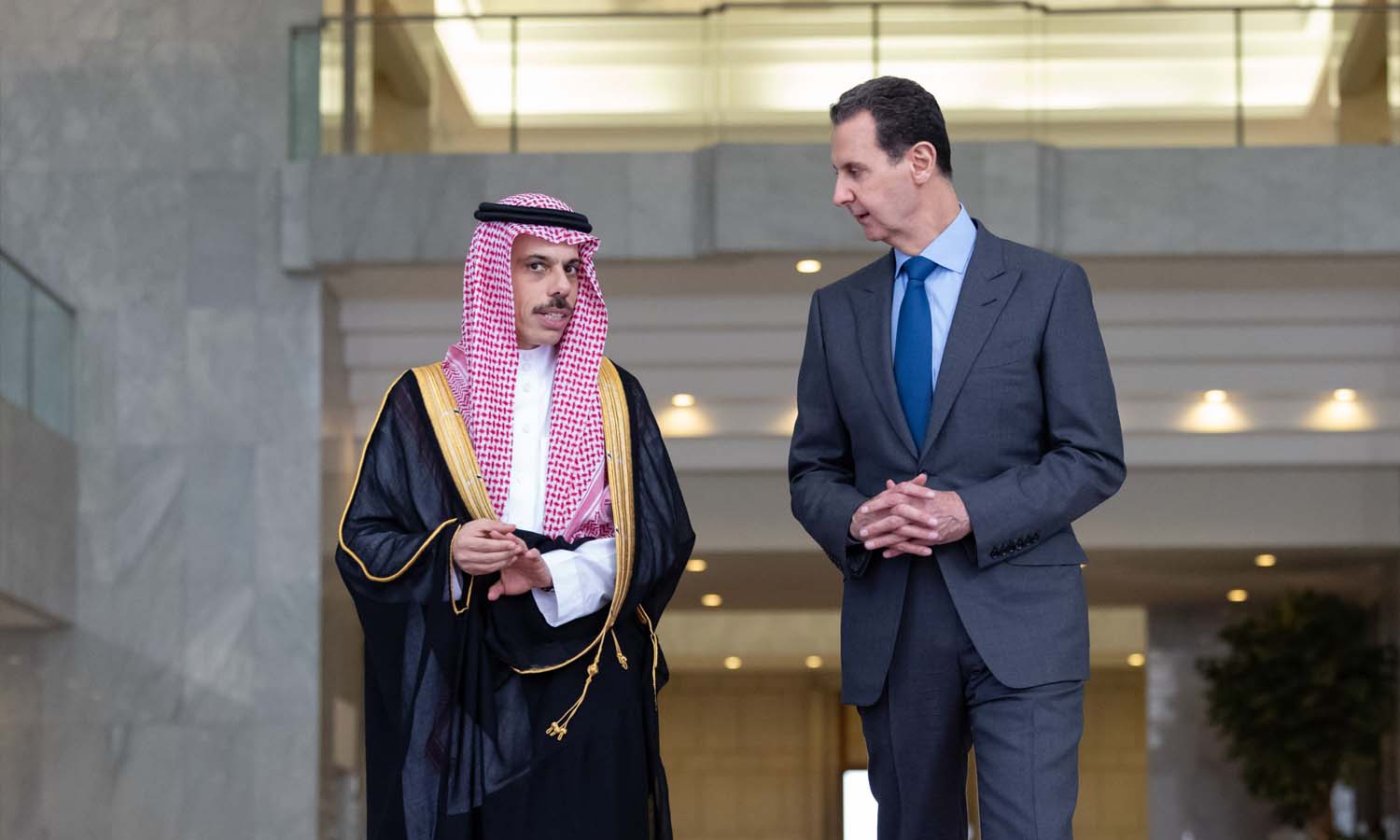
 The Saudi Foreign Minister, Faisal bin Farhan, meets with the head of the Syrian regime, Bashar al-Assad, on his first visit to Damascus since 2011 - April 18, 2023 (SPA)
The Saudi Foreign Minister, Faisal bin Farhan, meets with the head of the Syrian regime, Bashar al-Assad, on his first visit to Damascus since 2011 - April 18, 2023 (SPA)





 A
A
A
A
A
A
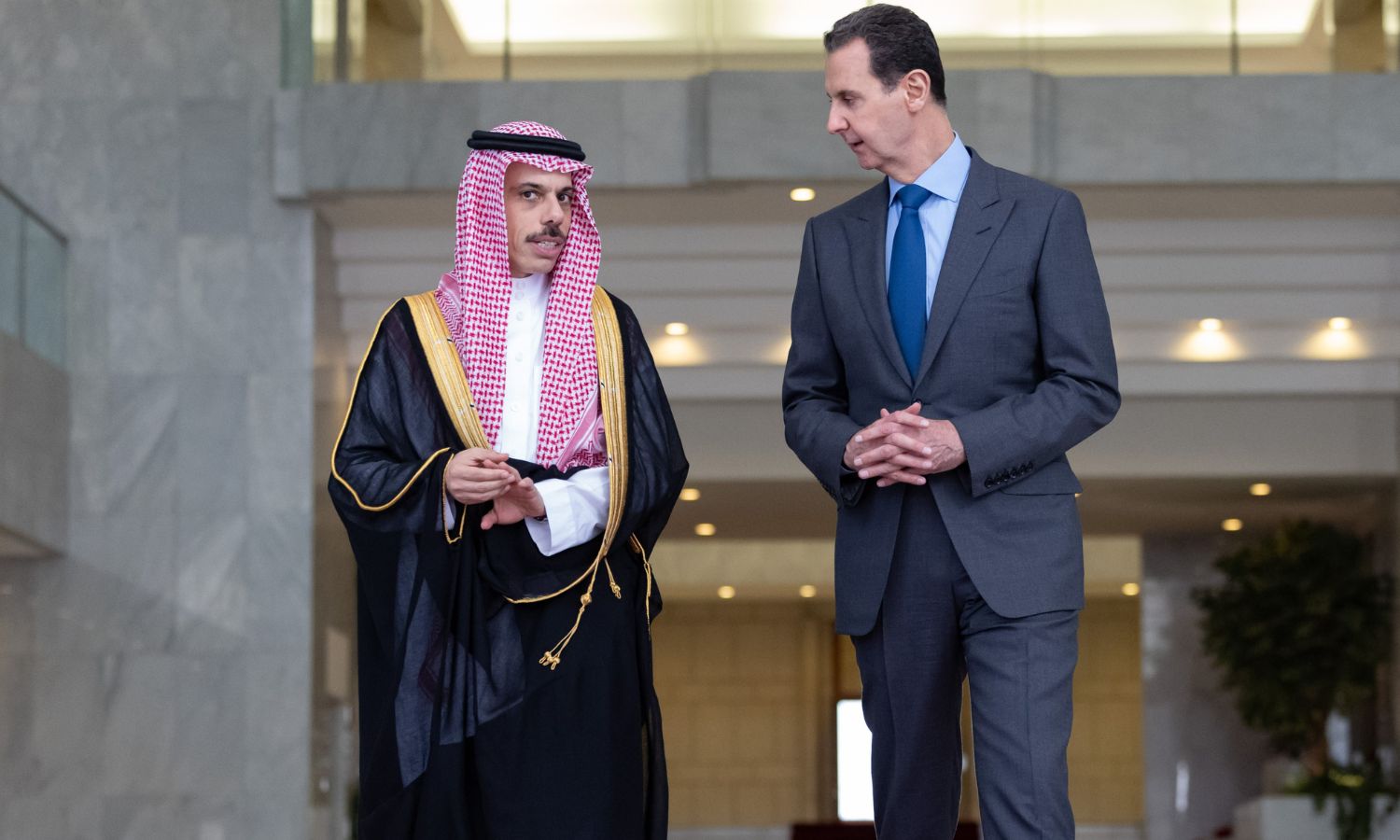


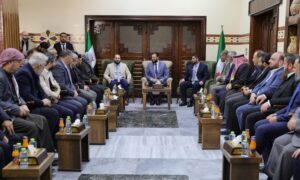

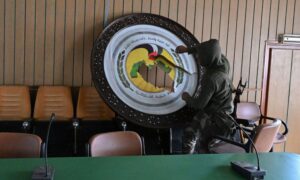
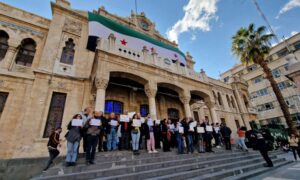
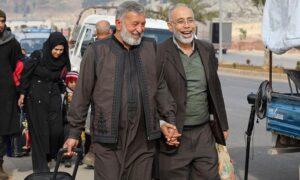
 More In-Depth
More In-Depth